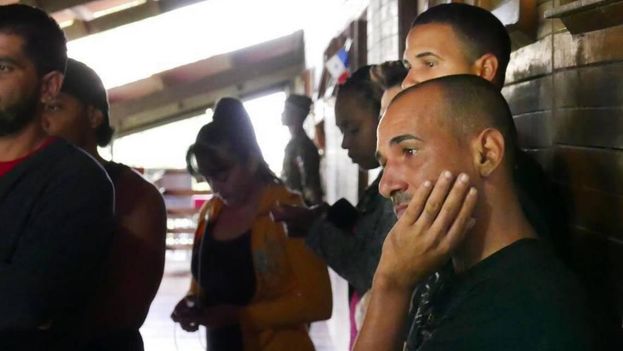
![]() 14ymedio, Mario Penton, Miami, 29 August 2017 — This Monday the process began to repatriate 75 undocumented migrants who were stranded in Panama after the United States ended the wet foot/dry foot policy that allowed Cubans who touched American soil to stay. The Cubans stranded in Panama accepted that government’s proposal to return to their own country, in exchange for financial support and a visa to legally return to Panama, but some say they feel “betrayed” because the first deportees were not given an appointment at the consulate.
14ymedio, Mario Penton, Miami, 29 August 2017 — This Monday the process began to repatriate 75 undocumented migrants who were stranded in Panama after the United States ended the wet foot/dry foot policy that allowed Cubans who touched American soil to stay. The Cubans stranded in Panama accepted that government’s proposal to return to their own country, in exchange for financial support and a visa to legally return to Panama, but some say they feel “betrayed” because the first deportees were not given an appointment at the consulate.
“We feel betrayed by Panama because they sent the first two emigrants to Cuba and did not give them an appointment at the consulate in Havana,” one of the Cubans, who has asked to remain anonymous for fear of reprisals, said via telephone.
This Monday a Cuban couple was repatriated to the island and according to the Panamanian Deputy Minister of Security, Jonathan Del Rosario, they received economic aid so that they can start over as self-employed. Regarding the consulate appointment, the couple says that they were only given telephone numbers for the Panama consulate in Havana and not a date as the deputy minister had said.
“I am a man of my word, and everything we have promised is going to be fulfilled,” Del Rosario told 14ymedio from Panama City.
According to the vice minister, the pre-appointment is a record that shows that the migrants have fulfilled the promise to return to Cuba. “The list of those who return will be transmitted to the consulate through the Foreign Ministry,” he explained.
“We have to have patience and confidence because everything we have promised has been fulfilled over time,” he added.
The first Cuban returnees were the ones who had spent the most time outside the country. According to the families of both migrants, who live in Havana, the trip was in line with what was planned and they are now “reuniting with family.”
“I have been very clear, very honest and very frank, I do not see why the migrants are suspicious,” said the deputy minister, who added that “those who misbehave or become rebellious will move from the Gualaca shelter to Migration for their deportation.” He lamented that the repatriation process could be at risk because of the despair of some islanders.
So far, no other migrants have been sent back to Cuba because it is the Panamanian administration that pays for the tickets and economic support, something for which it is still organizing the budget. “It’s a complex process that requires time,” Del Rosario explained.
Meanwhile, a dozen Cubans organized a press conference outside the Gualaca camp in Chiriquí province on Tuesday to complain that they have been victims of a “deception.”
“Not all Cubans think in the same way, there are some of us who are ungrateful and don’t value what this country is doing for us, but we are not everyone,” says a second migrant who asks for anonymity for fear of the protest leaders.
“We are desperate, that is true. The months pass and we are still here thinking that we will have to return to Cuba and start from scratch,” he adds.
Note: Our apologies that these videos are not subtitled in English
The Cubans fear having to face the difficult task of getting an appointment at the Panama embassy in Havana. Some applicants have waited more than six months to be seen by the consulate due to the thousands of calls received every Thursday to process visas to that country. Faced with increasing demand, Panama’s Director of Immigration, Javier Carrillo, told 14ymedio that the number of visas would increase from the current 500 to about 1,000.
At the end of June, the Panamanian government proposed to the 124 Cubans who were in the Gualaca camp that they voluntarily return to their country in exchange for $1,650 and a multiple entry visa to Panama.
A little more than half of the undocumented immigrants accepted this proposal because of the impossibility of legalizing their status in the country or entering the United States where, as of January 12, with the end of the wet foot/dry foot policy, Cubans lost the privilege of being granted automatic refuges status if they reached American soil.
